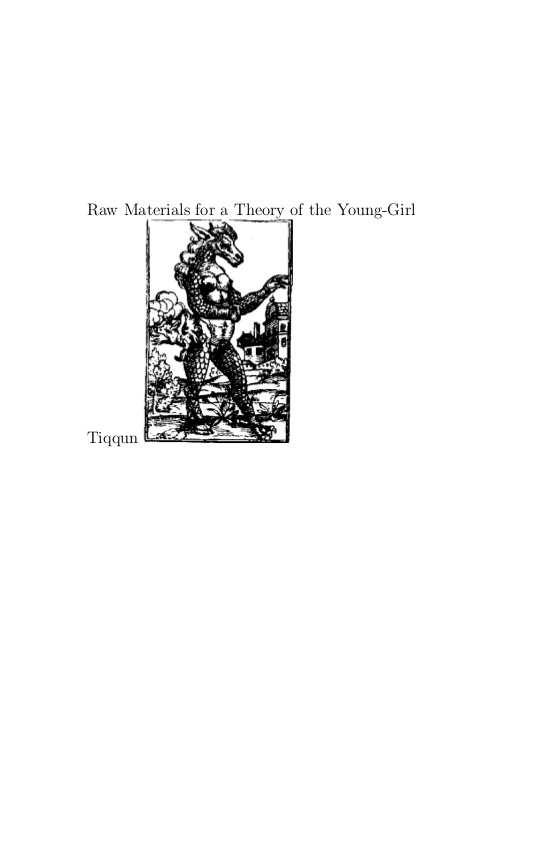Bernard Stiegler: Decadence of Industrial Democracies. Disbelief and Discredit, vol. 1 (2004/2011)
Filed under book | Tags: · biopolitics, capitalism, culture industry, democracy, desire, nihilism, philosophy, politics, production, singularity, technology

“Bernard Stiegler is one of the most original philosophers writing today about new technologies and their implications for social, political and personal life. Drawing on sources ranging from Plato and Marx to Freud, Heidegger and Derrida, he develops a highly original account of technology as grammatology, as a technics of writing that constitutes our experience of time, memory and desire, even of life itself. Society and our place within it are shaped by technical reproduction which can both expand and restrict the horizons and possibilities of human agency and experience.
In the three volumes of Disbelief and Discredit Stiegler argues that this process of technical reproduction has become dangerously divorced from its role in the constitution of human experience. Radically challenging the optimistic view of new technologies as facilitators of learning and progress, he argues new marketing techniques short-circuit thought and disenfranchise consumers, programming them to seek short-term gratification. These practices of ‘libidinal economics’ have profound consequences for nature of human desire and they underpin the social and psychological malaise of contemporary industrial society.
In this opening volume Stiegler argues that the industrial model implemented since the beginning of the twentieth century has become obsolete, leading capitalist democracies to an impasse. A sign of this impasse and of the decadence to which it leads is the banalization of consumers who become ensnared in a perpetual cycle of consumption. This is the new proletarianization of the technologically infused, hyper-industrial capitalism of today. It produces a society cut off from its past and its future, stultifying human development and turning democracy into a farce in which disbelief and discredit inevitably arise.”
First published in French as Mécréance et Discrédit: Tome 1, La décadence des démocraties industrielles, Galilée, 2004.
Translated by Daniel Ross and Suzanne Arnold
Publisher Polity, 2011
ISBN 0745648096, 9780745648095
200 pages
Review: Tom Bunyard (Radical Philosophy, 2012).
PDF (updated on 2020-8-7)
Comment (0)Tiqqun: Raw Materials for a Theory of the Young-Girl (1999–) [EN, DE]
Filed under book | Tags: · biopolitics, biopower, body, capitalism, consumerism, desire, feminism, labour, love, metaphysics, philosophy, reification, seduction, sexuality, theory

“First published in France in 1999, Preliminary Materials for a Theory of the Young-Girl dissects the impossibility of love under Empire. The Young-Girl is consumer society’s total product and model citizen: whatever “type” of Young-Girl she may embody, whether by whim or concerted performance, she can only seduce by consuming. Filled with the language of French women’s magazines, rooted in Proust’s figure of Albertine and the amusing misery of (teenage) romance in Witold Gombrowicz’s Ferdydurke, and informed by Pierre Klossowski’s notion of “living currency” and libidinal economy, Preliminary Materials for a Theory of the Young-Girl diagnoses — and makes visible — a phenomenon that is so ubiquitous as to have become transparent.
In the years since the book’s first publication in French, the worlds of fashion, shopping, seduction plans, makeover projects, and eating disorders have moved beyond the comparatively tame domain of paper magazines into the perpetual accessibility of Internet culture. Here the Young-Girl can seek her own reflection in corporate universals and social media exchanges of “personalities” within the impersonal realm of the marketplace. Tracing consumer society’s colonization of youth and sexuality through the Young-Girl’s “freedom” (in magazine terms) to do whatever she wants with her body, Tiqqun exposes the rapaciously competitive and psychically ruinous landscape of modern love.” (from Semiotexte, the publisher of the 2012 edition)
Announcement and discussion about the translation
Commentary (Rob Horning, 2012)
More commentaries (compiled by 1000 Little Hammers, 2013)
Originally published in French as Premiers matériaux pour une Théorie de la Jeune-Fille in Tiqqun 1, 1999
Revised, republished by Éditions Mille et une nuits, 2001.
Translator unknown
Published on younggirl.jottit.com, Jan 2010
PDF (2010)
HTML (2010)
HTML (2012 edition, trans. Ariana Reines, Preliminaries + Chapters 6 & 7)
German edition (2009)
Angela Mitropoulos: Contract & Contagion: From Biopolitics to Oikonomia (2012)
Filed under book | Tags: · biopolitics, capitalism, debt, feminism, marxism, neoliberalism, post-fordism, value

Contract and Contagion presents a theoretical approach for understanding the complex shifts of post-Fordism and neoliberalism by way of a critical reading of contracts, and through an exploration of the shifting politics of the household. It focuses on the salient question of capitalist futurity in order to highlight the simultaneously intimate, economic and political limits to venturing beyond its horizon.
In capitalist history, as well as in philosophy, finance, migration politics, and theories of globalisation, contagions simultaneously real, symbolic and imagined recur. Where political economy understood value in terms of labour, Contract and Contagion argues that the law of value is the law of the household (oikonomia).
In this book Angela Mitropoulos takes up current and historical theories of affect, intimacy, labour and speculation to elaborate a queer, anti-racist, feminist Marxism, which is to say: a Marxism preoccupied not with the seizure of opportunity to take power, form government, or represent an identity, but a Marxism which partakes of the uncertain movements that break the bonds of fate.
Publisher Minor Compositions, Wivenhoe/New York/Port Watson, an imprint of Autonomedia, Brooklyn, NY, October 2012
ISBN 1570272565, 9781570272561
256 pages
PDF
View online (from the publisher)

